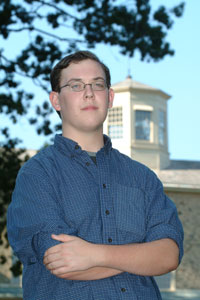BREATHING IN: AFTER KATRINA

Details
Ross Doppelt of Havertown and his parents, Harvey Doppelt and Elaine Carroll, had a nice flight to New Orleans on Friday, August 26, and checked into the Prytania Park Hotel in the Garden District, close to Tulane University, where Ross would be matriculating in Economics the following Monday, August 29th — the day Hurricane Katrina was due to hit town. The Doppelts bought sheets, towels, detergent, and all the necessary field gear for freshmen, had dinner and "looked around" a little, then turned in. The next day they piled Ross's stuff into their rental car, and headed to the Tulane campus for Move-In. But as soon as they got there, they were informed that the campus was being evacuated, because Katrina, which had already killed two people cutting across Florida as a Category 1 storm (75 mph winds), was pumping up strength over the warm waters of the Gulf of Mexico, and was now expected to make land as a Category 3 (110 mph winds): "I took everything we'd bought upstairs to my second-floor room and stuck it under the bed," Ross remembers. "I met my new roommate, Philip Fontenot, who was from Lafayette, Louisiana, about two hours west of New Orleans, and he was kind enough to invite me to ride the storm out at his place, " — a good deal because Lafayette was not so close to Katrina's center..."I had maybe 15 non-consecutive minutes to appreciate Tulane, and we were out of there." Other freshman were being bussed to Jackson, Mississippi, by the school. About 400 went.
Ross checked his watch. He'd spent exactly 26 hours in New Orleans.
At that point, classes were expected to begin on Wednesday. Mr. and Mrs. Doppelt had been lucky in reserving a rental car (agencies were soon sold out), and just headed for Houston, the closest place where they could catch a direct flight back to Philadelphia. Ross and Philip drove west, without any real sense of urgency: "New Orleans people were blasé about bad weather, and so was I — I'm used to forecasters exaggerating and sensationalizing everything." It was cloudy and oppressive, and there were squalls, but no one thought Katrina would turn into a Category 4, with 175 mph winds, one standard above the levels the New Orleans levees had been certified for by the Army Corps of Engineers.
By Sunday night, the bad news was in. Katrina was already howling, and expected to hit the city directly, maybe as a Category 5, with 200 mph winds. At the last possible moment though, around dawn on Monday, she hooked to the right and smote Biloxi and Gulfport.
Lafayette wasn't bad — a lot of signs blown down , some trees uprooted and lots of heavy rain, but there was none of the catastrophic flattening or flooding that eastern Louisiana and coastal Mississippi and Alabama got: "We didn't even lose power. We watched the weather channel and CNN the whole time, and you wouldn't have guessed we were so close to all that devastation two hours east..."
On Tuesday Ross and Philip decided to drive into Baton Rouge, only 75 miles west of New Orleans, to retrieve Phil's grandmother, who'd been visiting family, and gotten caught there. In Baton Rouge there were many downed trees and power lines, so it seemed best to just get the elder Mrs. Fontenot and head for Lafayette. They did that with a minimum of trouble, but then Ross was beginning to feel hinky about Tulane's re-opening schedule. "You could sort of tell that they were pushing back the dates, postponing class resumption, so I got nervous. I wanted to start school..."
He got a flight out Wednesday night from Lafayette (New Orleans' levees broke on Tuesday), and by that time his dad had already been in touch with Penn and Haverford. "It wasn't realistic to expect Tulane to be able to recover enough to do a full semester" [after the Garden District flooded]. Penn at first said it only had room for Ross in its College of General Studies, when he wanted Arts & Sciences, so by Thursday Harvey Doppelt was talking to Jess Lord, Haverford dean of Admission and Financial Aid, and Friday, Ross was on campus, filling out paperwork while Lord met with Tom Tritton to make his "Guest" student status happen. He started class with the other freshmen on Labor Day, September. 5.
Now he's taking Introduction to Macroeconomics with Anne Preston; History of the Mediterreanean World with Alex Kitroeff; Steve Hock's Adaptation of Literature into Film; and Mark Skandera's Calculus. He'll stay for a semester at least, or until Tulane reopens, and is free to apply to Haverford, if he chooses. But essentially he's here as a full-time non-degree candidate, an exception for an emergency situation that usually applies to true exchange students — "and [is] not usually available to someone who has not yet done any college work," Jess Lord explains. The cost of attending Haverford for the semester will be remitted to Tulane. "Yeah," Ross says. "My first college experience was here."
"The situation down [in Louisiana] was a big mess," he concludes. "The fact that people staying at the Hyatt were bussed out of town first, while the poor people were left in the Convention Center and the [Louis Armstrong] Airport to die is beyond unfair...The federal government has mismanaged the situation severely."



